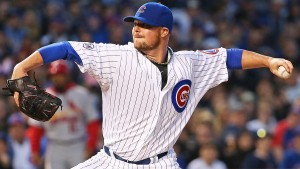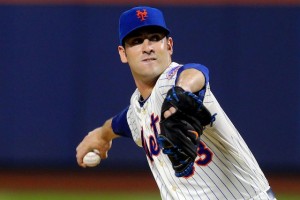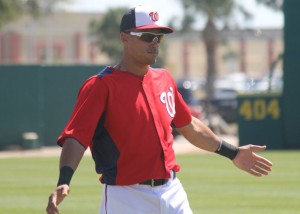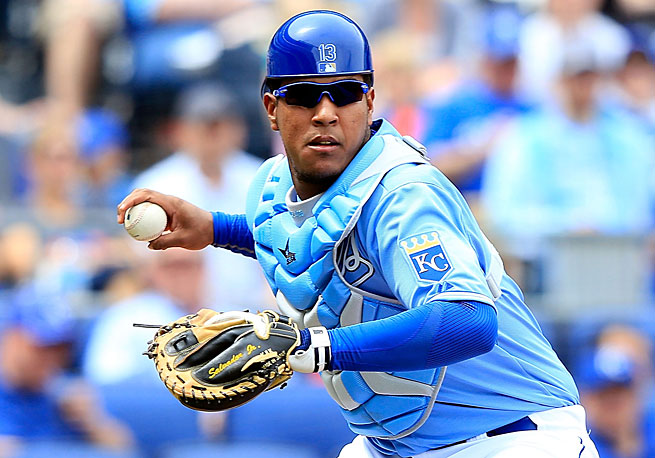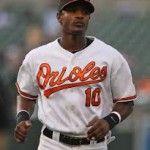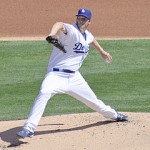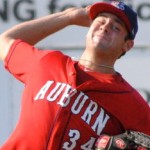
Can Giolito live up to his potential? Photo unk via federalbaseball.com
Two off-seasons ago, I did an analysis piece discussing the “ceilings” of the various pitchers (focusing on starters in the system) on our major and minor league rosters. That led to some good discussions in the comments about what the definition of a pitcher’s ceiling is, about what a “#3” starter is, etc.
Now that the 2013 season has ended, I thought it’d be a good topic to revisit and factor in recent performances and the last couple year’s worth of player movement in and out of the organization.
This post mostly focuses on the Starters we have in the organization. There’s no real mention of guys who are already in the bullpen (either in the majors or the minors) unless we have heard rumors of them converting back to being starters at some point or another.
Some setup
What do I mean by a #1, #2, #3, #4 or #5 starter? With some simple examples (from the 2011 post)
- A #1 starter is a MLB-wide “Ace,” one of the best 15-20 pitchers in the league, someone who you’re genuinely surprised if he performs badly on a given day, opten mentioned in Cy Young conversations. Guys like Clayton Kershaw and Justin Verlander.
- A #2 starter is a slight step down from your elite “Aces,” but still an excellent starter. Can challenge for the top awards if they put everything together for a season, but remains consistently above average. I see guys like Madison Bumgarner, Homer Bailey or James Shields in this category
- A #3 starter is better than your league average pitcher, someone who is solid, consistent innings eater and who routinely gives you quality starts but not much more than that. I think of guys like Mark Buehrle, Kyle Lohse, or John Lackey here.
- A #4 starter is basically someone defined as someone who’s a slight step above the back-of-the-rotation guy, usually a veteran guy who knows how to pitch but doesn’t have the best stuff to really go much beyond or a younger guy who is establishing a foothold of a career. Good examples from this year could include the likes of Kyle Kendrick, or Edwin Jackson or Bronson Arroyo.
- A #5 starter is just good enough to fill out your rotation. Starters at the back end who all you’re hoping for is 6 innings and keeping your team in the game. Think of someone like Jason Marquis at this point in his career, or Ryan Vogelsong.
For clarity; if your team has three excellent pitchers, it does not mean that a league-wide ace is defined by these standards as a “#3” starter. When the Phillies big 3 of Roy Halladay, Cliff Lee and Cole Hamels were all healthy and firing on all cylinders a couple of years back, all three were #1 starters in my book. Just because Hamels pitched third in the rotation didn’t mean he was a “#3 starter.”
Also before getting going, a quick discussion on “ceiling” versus “predictions” and what I’m trying to do here. As was pointed out when I posted on this topic in 2011, a pitcher’s “ceiling” is quite literally the highest level of capability that we can expect that pitcher to accomplish given a perfect set of circumstances. Scouts routinely talk about player “ceilings” and “number X” starters as a convenient way to speak a common language when describing a pitcher. I like to be a bit more grounded in predicting what may happen to pitchers, so this analysis is less about the perfect-scenario “ceiling” as it is a thoughtful prediction on where a guy may eventually fit in given his talents and his performances as compared to scouting reports and industry buzz.
Updated ceiling predictions for Nats pitchers post 2013 season:
Nationals Starter Ceilings (per scouting reports, personal observations). I’m not going to include any MLFAs here, assuming that they’re all either 4-A or minor league starters as a ceiling. I’m also only really going down to full-season ball guys, throwing in a couple of our higher-end prospects. Its just impossible to really project guys in rookie ball unless you’re a professional scout.
- #1: Strasburg, Giolito
- #2: Gonzalez, Zimmermann
- #3: Cole, Ray
- #4: Jordan, Roark
- #5: Detwiler, Solis
- MLB bullpen: Purke, Karns, Ohlendorf, Garcia, Johansen, Treinen
- 4-A starter: Hill, Mooneyham, Schwartz, Voth, Meyers
- Minors starter: Rosenbaum, Maya, Gilliam, Rauh, Anderson, Encarnacion, Bacus, Turnbull
- Minors bullpen: Perry, Demny, RPena
Discussion:
#1 Starters: Stephen Strasburg is already an “Ace” starter in this league, ranking up among the 15-20 best arms out there. However he’s no longer considered in the same class as the likes of Kershaw, thanks to injury and a curious lack of dominance this year (have a draft post on this topic that i’ll expand on later). Lucas Giolito is widely considered the Nats top prospect and an easy future #1 pitching prospect. Big guy, big arm, and by all accounts has come back post TJ surgery. The BA guys think that he could be the #1 prospect in the entire minors with another dominant 2014. How quickly can he move through the minors? Can he stay healthy? Right around the time Giolito arrives, the Nats “3 big names” could all be at the end of their current contracts and an interesting conundrum could face the team; keep the band together? Or let these guys go and re-load/re-build?
#2 Starters: Just as Gio Gonzalez made the leap to a #2 starter with his Cy Young challenging 2012, Jordan Zimmermann has made that leap by virtue of his near-20 win season in 2013. I believe these two guys can stay as #2 starters for the next few years, until they hit the regression stages of their careers.
#3 Starters: A.J. Cole has regained his mojo after bouncing around the California league and advanced to AA this year. He features a significant fastball and but complaints in the scouting world about his secondary stuff lead him to a #3 starter prediction. I think he should be a #2 ceiling, and perhaps a spring training working with the Nats staff can get him back where we thought he was when we drafted him. I’m sure picking Robbie Ray to have a higher likely ceiling than his 2013 AA counterparts would be mocked. But look at the evidence: he’s the same age and same draft class as Cole and has consistently out-performed him when they’ve been on the same team. He’s lefty, he averaged well over a K/inning this year, and suddenly he’s 22 and he may be “done” with AA. Why aren’t his credentials higher with prospect-watchers? It isn’t has if he’s a soft-tosser; he throws decent stuff from the left side. I continue to think he’ll move along with Cole and they’ll be promoted to the majors within a couple of weeks of each other, perhaps mid 2015.
#4 Starters: If you want to say I’m crazy for thinking that Tanner Roark can maintain his September pace as a starter for this team, I can understand. I’m not personally convinced that he’s going to be a mediocre 6th inning reliever or continue to be a Kris Medlen-in-2012 anomoly who continues to get guys out. For now, i’m rooting for the better story. Meanwhile I’m also not convinced that I have Taylor Jordan pegged properly; I think honestly he could be a #3 pitcher in the league. This lack of real punch-out capabilities is what’s holding him back for now. That being said, guys don’t just come up to the majors and post a 3.66 ERA. For now, a #4 ceiling sounds good.
#5 Starters: I’ve come to believe that Ross Detwiler‘s reached his ceiling; his 2012 season is as good as we’re going to see him. Not because of a lack of talent; its because he just can’t stay healthy. I’ve seen and heard reports that Detwiler’s stuff is fantastic; that’s great on paper but he just can’t seem to translate that to the big club on a consistent basis. I would not shed a tear if he headed to the bullpen, other than to think that its a waste of his talents. I also feel like Sammy Solis will stay as a starter and continue to climb up the ranks, and tops out as a 5th starter just by virtue of his being left handed. There’s just something to be said about being a lefty with decent stuff being able to hang around the league (think of someone like Eric Stults).
MLB Bullpen: Right now i’m projecting a whole handful of our good minor league starters to eventually get transitioned to the bullpen. Which is good and bad; good for this team as they continue to develop arms and continue to have quality guys in the pen. But bad in that it predicts a severe thinning of the starting pitching corps. First off, I think the Christian Garcia as starter experiment is over; he needs to focus on being a reliever so that he can stay healthy and contribute. I believe that Ross Ohlendorf‘s time as a starter is over, but he should slot in nicely as the 7th guy/long-man/spot-starter that this team will need here and there in 2014. The more I think about Nathan Karns, the more I think he’d make an excellent setup guy. Big arm, big fast-ball, not really that much secondary stuff. He got hit hard as a starter; in shorter stints he could dial it up more and focus on his limited arsenal. Unfortunately I think Matthew Purke may be headed to the pen as well, but his gun-slinger action could make him an excellent later-innings pitcher, perhaps even a closer, if he can translate that to a bit more velocity. Lastly the reported two biggest arms in the minors (Jake Johansen and Blake Treinen) project for now as bullpen guys. Again, I hope I’m wrong, but so far the evidence seems to point at big velocity and little else.
What is a 4-A starter? A guy basically who looks good in AAA but who, for whatever reason, can’t translate that success to the Majors. They may get a call-up here and there but never pitch well enough to stick. This is how I see a handful of guys ending up: Brad Meyers has been hanging around this status for several seasons and just can’t get a break. I’ve also tagged some guys with good numbers in the lower minors but with fringy scouting reports with this for now, thinking that a lack of a dominant fastball means they’ll stay as a starter until they reach their peak. Taylor Hill, Blake Schwartz, and Austin Voth all seem to fit this bill. Lastly the curious lack of dominance of Brett Mooneyham lends me to believe he’ll end up in this predicament as well. I hope I’m wrong here; I’d love to see these guys take the leap, or (save that) find success in the bullpen.
Career Minors Starter: Unfortunately, I think we’ve seen the best that Danny Rosenbaum and Yunesky Maya can give; they’ve both had shots at a major league roster and couldn’t stay. I think they’ll retire as AAA starters. The rest of these guys listed are mediocre-to-decent starters in the system who don’t seem to be listed as true prospects. I’m specifically disappointed thus far in Kylin Turnbull, who couldn’t make the leap to high A and seems like he needs to make some sort of adjustment in 2014.
Career Minors Bullpen guys: When Ryan Perry passed through waivers off the 40-man roster, his chances of ever making it back to the majors took a huge dent. Paul Demny‘s precipitous drop this season also seems to spell doom for his career. And apropos of nothing else, Ronald Pena seems like he has achieved the dreaded “organizational arm” tag.
On the bright side, the top-heavy nature of this list gives fans optimism for the power of this rotation for years to come. In 3 year’s time (if Giolito, Ray and Cole all matriculate as expected) you’d have two Aces, two #2s and two #3s to choose from for your rotation. That’s significant, considering that lots of teams are scraping the bottom of the barrel for their 5th starter. If Ray and Cole turn into servicable major leaguers, you could trade/let go a guy who gets too expensive (Gonzalez or Zimmermann) with an able, cheap replacement. Maybe I’m too high on Ray and Cole (who are both youngsters) … but then again maybe i’m too low on Jordan and Roark (both of whom have already shown the ability get major league hitters out).
Agree/Disagree/Hate what I’ve written? I’m open to criticism.
